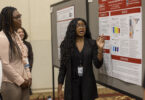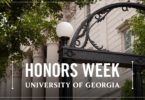Athens, Ga. – Charles S. Hopkinson, a senior scientist at the Marine Biological Laboratory in Woods Hole, Mass., has been named director of the Georgia Sea Grant Program, effective January 1.
Located at the University of Georgia, Georgia Sea Grant is part of a nationwide network of 30 university-based programs administered through the National Oceanic and Atmospheric Administration (NOAA) to work with coastal communities on the sustainable use and conservation of coastal and ocean resources.
Hopkinson, who earned both his master’s and doctoral degrees in marine sciences at Louisiana State University, has a broad background in coastal marine and resource issues in Georgia, the southeast and nationally. After completing his Ph.D. at LSU, Hopkinson worked as a marine scientist at the University of Georgia for 10 years. Prior to leaving UGA, Hopkinson served as a visiting professor for a year at the Askö Laboratory, University of Stockholm. He moved to Massachusetts in 1989, where he became a senior scientist at The Ecosystems Center, Marine Biological Laboratory in Woods Hole and a professor of ecology and evolutionary biology in the Brown University – MBL Joint Program.
“Chuck Hopkinson is an accomplished scientist whose studies of wetland and coastal ecology are recognized internationally,” said UGA Vice President for Research David Lee. “His return to Georgia promises to bring new vitality and perspective to the Sea Grant Program and will add to the university’s prominence in ecology and the environment at a timely moment. We look forward to his efforts to enhance the visibility and impact of Georgia Sea Grant and to strengthen ties between the program’s partners.”
Hopkinson’s research interests include wetland and aquatic ecology, element cycles in marine and fresh water systems, microbial ecology, nitrogen and phosphorus cycling, land use change and watershed dynamics, modeling and integrated assessment.
Hopkinson has a long association with NOAA Sea Grant, having received grants throughout his career. He directed the Land-Margin Ecosystem Research and the Long-Term Ecological Research projects on Plum Island Sound in Massachusetts. He has considerable experience in the biochemistry of marsh-dominated coastal ecosystems with an emphasis on human activity, climate change and sea level rise.
State Sea Grant programs respond to local coastal needs through collaborations with government, academia and industry. Approximately half of NOAA funding for Georgia Sea Grant supports scientific research on Georgia’s coastal resources, while the remainder supports outreach, education, and communications.





